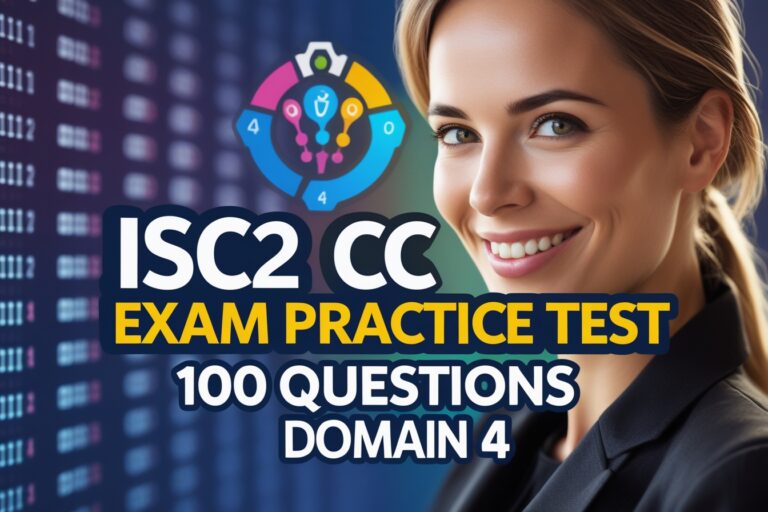1. ………………. is a decision to add a new process to the set of processes that are currently active. It is performed when a new process is created.
A) Long term scheduling
B) Medium-term scheduling
C) Short term scheduling
D) I/O scheduling
2. ………………. is a part of the swapping function in which the decision to add to he number of process that are partially or fully in main memory.
A) Long term scheduling
B) Medium term scheduling
C) Short term scheduling
D) I/O scheduling
3. …………….. is the actual decision of which ready process to execute next.
A) Long term scheduling
B) Medium term scheduling
C) Short term scheduling
D) I/O scheduling
4. State whether the following statements about long term scheduling are True or False.
i) It controls the degree of multi-programming
ii) It determines which programs are admitted to the system for processing.
iii) It is the part of swapping function.
A) i-False, ii-True, iii-False
B) i-True, ii-True, iii-False
C) i-True, ii-False, iii-True
D) i-False, ii-True, iii-True
5. ………………. may limit the degree of multi-programming to provide satisfactory service of the current set of process.
A) Long term scheduler
B) Medium term scheduler
C) Short term scheduler
D) I/O scheduler
6. State which of the following statements about medium term scheduling are correct.
i) Medium term scheduling is a part of swapping function
ii) The swapping in decision is based on the need to manage the degree of multi-programming.
iii) It is invoked whenever an event occurs that may lead to the suspension of the current process.
A) i and ii only
B) ii and iii only
C) i and iiii only
D) All i, ii and iii
7. ……………… executes relatively infrequently and makes the coarse-grained decision of whether or not to take on a new process.
A) Long term scheduler
B) Medium term scheduler
C) Short term scheduler
D) I/O scheduler
8. ……………. also known as the dispatcher, executes most frequently and makes the fine grained decision of which process to execute next.
A) Long term scheduling
B) Medium term scheduling
C) Short term scheduling
D) I/O scheduling
9. The ……………… is invoked whenever an event occurs that may lead to the suspension of the current process of that may provide an opportunity to preempt a currently running process in favor of another.
A) Long term scheduling
B) Medium term scheduling
C) Short term scheduling
D) I/O scheduling
10. The short term scheduler is invoked, in which of the following event occurs.
i) clock interrupts ii) I/O interrupts iii) Operating system calls iv) Signals
A) i, ii and iii only
B) ii, iii and iv only
C) i, iii and iv only
D) All i, ii, iii and iv
11. …………….. includes actual execution time plus time spent waiting for resources, including the processor.
A) Response time
B) Turnaround time
C) Deadlines
D) Throughput
12. ……………… is the time from the submission of a request until the response begins to be received.
A) Response time
B) Turnaround time
C) Deadlines
D) Throughput
13. ……………. is the measure of how much work is being performed which depends on the average length of a process.
A) Throughput
B) Fairness
C) Enforcing priorities
D) Balancing resources
14. State whether the following statements about response time are True or False.
i) An example is response time in a interactive system
ii) It is visible to the user and is naturally of interest to the user
iii) In the case of response time, a threshold may be defined.
A) i-False, ii-True, iii-False
B) i-True, ii-True, iii-False
C) i-True, ii-False, iii-True
D) i-True, ii-True, iii-True
15. ……………….may be based on priority, resource requirements or the execution characteristics of the process.
A) Selection function
B) Decision mode
C) Throughput
D) Overhead
16. Preemptive policies incur greater …………….. than non-preemptive ones but may provide better service to the total population of process.
A) Selection function
B) Decision mode
C) Throughput
D) Overhead
17. The selection function of shortest process next (SPN) scheduling policy is ……
A) max[w]
B) constant
C) min[s]
D) min[s-e]
18. The selection function of first-come-first-served (FCFS) scheduling policy is ……
A) max[w]
B) constant
C) min[s]
D) min[s-e]
19. Which of the following are the algorithms have been developed for making t he short-term-scheduling decision.
i) Round robin ii) Shortest Process Next (SPN) iii) Shortest Remaining Time (SRT) iv) Feedback
A) i, ii and iii only
B) ii, iii and iv only
C) i, iii and iv only
D) All i, ii, iii and iv
20. …………….. establish a set of scheduling queues and allocate processes to queues on execution history and other criteria.
A) Round robin
B) Shortest Process Next (SPN)
C) Shortest Remaining Time (SRT)
D) Feedback
21. …………….. algorithm use time slicing to limit any running process to a short burst of processor time, and rotate among all ready processes.
A) Round robin
B) Shortest Process Next (SPN)
C) Shortest Remaining Time (SRT)
D) Feedback
22. …………… algorithm select the process that has been waiting the longest for service.
A) Round robin
B) Shortest Process Next (SPN)
C) First Come First Served (SCFS)
D) Feedback
23. Which of the following statements about first-come-first-serve algorithm are correct.
i) It tends to favor processor bound processes over I/O bound processes.
ii) It may result inefficient use of both the processor and I/O devices
iii) It is an attractive alternative on its own for a single processor system
A) i and ii only
B) ii and iii only
C) i and iiii only
D) All i, ii and iii
24. ………….. is particularly effective in general purpose time sharing system or translation processing system.
A) Round robin
B) Shortest Process Next (SPN)
C) First Come First Served (SCFS)
D) Feedback
25. …………… policy reduces the bias in favor of long processes inherent in first come first served (FCFS).
A) Round robin
B) Shortest Process Next (SPN)
C) First Come First Served (SCFS)
D) Feedback
26. ………………. is a non preemptive policy in which a short process will jump to the head of the queue past longer jobs.
A) Round robin
B) Shortest Process Next (SPN)
C) Shortest Remaining Time (SRT)
D) Feedback
27. One difficulty with …………… is the need to know or at least estimate the required processing time of each process.
A) SPN Policy
B) SRT Policy
C) SCFS Policy
D) Round robin Policy
28. With …………….. the scheduler may preempt whenever a new process becomes ready.
A) SPN Policy
B) SRT Policy
C) SCFS Policy
D) Round robin Policy
29. ……………….. should also give superior turnaround time performance to SPN, because a short job is given immediate preference to a running longer job.
A) SPN
B) SRT
C) SCFS
D) Round robin
30. …………….. policy base the scheduling decision on an estimate of normalized turnaround time.
A) Round robin
B) Shortest Process Next (SPN)
C) Shortest Remaining Time (SRT)
D) Highest Response Ratio Next (HRRN)
Answers
1. A) Long-term scheduling
2. B) Medium-term scheduling
3. C) Short-term scheduling
4. B) i-True, ii-True, iii-False
5. A) Long term scheduler
6. A) i and ii only
7. A) Long term scheduler
8. C) Short term scheduling
9. C) Short term scheduling
10. D) All i, ii, iii and iv
11. B) Turnaround time
12. A) Response time
13. A) Throughput
14. D) i-True, ii-True, iii-True
15. A) Selection function
16. D) Overhead
17. C) min[s]
18. A) max[w]
19. D) All i, ii, iii and iv
20. D) Feedback
21. A) Round robin
22. C) First Come First Served (SCFS)
23. A) i and ii only
24. A) Round robin
25. B) Shortest Process Next (SPN)
26. B) Shortest Process Next (SPN)
27. A) SPN Policy
28. B) SRT Policy
29. B) SRT
30. D) Highest Response Ratio Next (HRRN)






